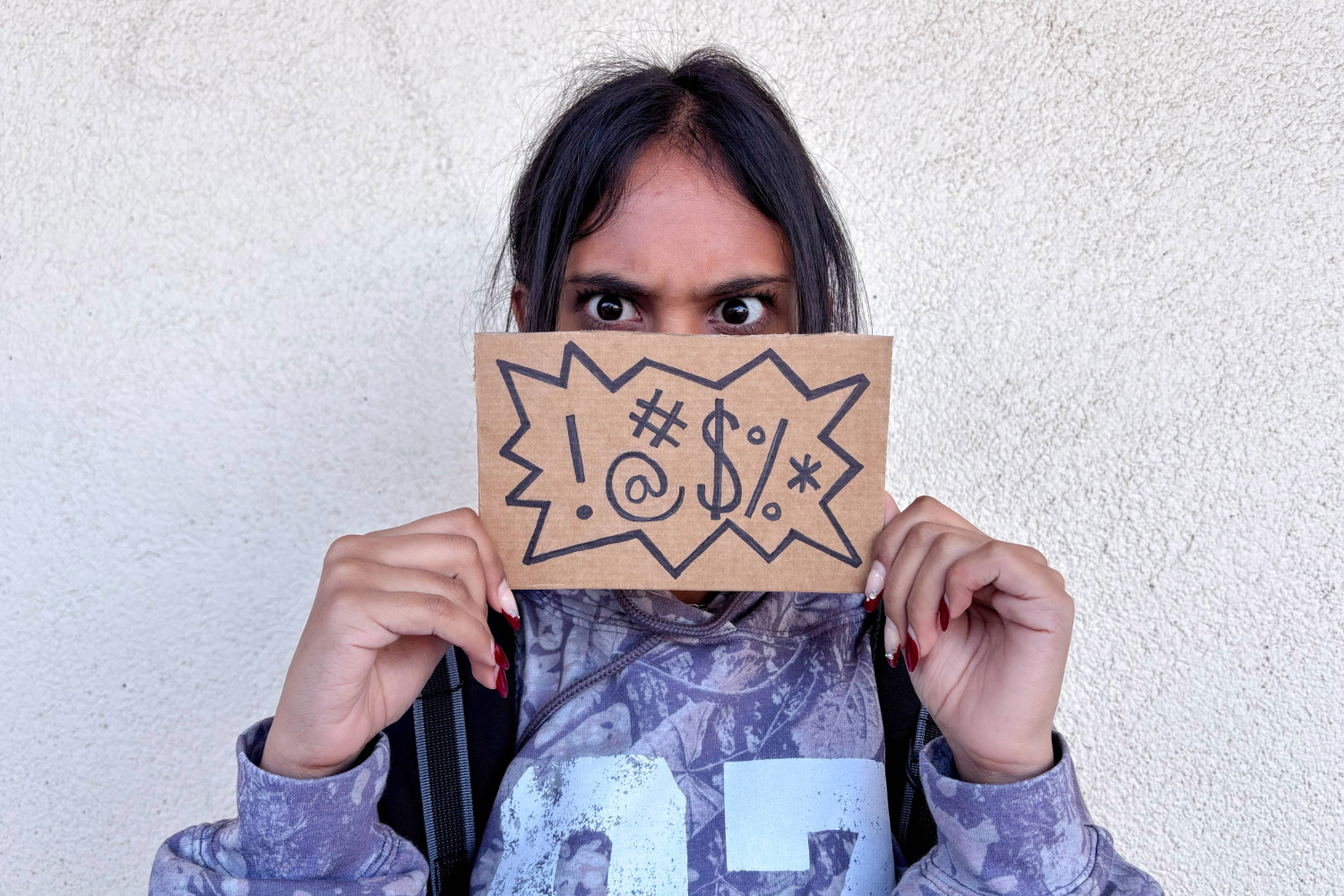Dang it. Shoot. Frick. And much worse.
Swearing is a well-known taboo, even considered a sin in some religions and cultures. However, contrary to popular belief, it is not actually inherently bad or a sign of immaturity — it’s the opposite. For teens and adults alike, profanity has been proven to have many wellness benefits.
Wellness, or one’s well-being, is multidimensional, with the main three aspects being the physical, emotional, and social dimensions. Swearing affects all of them.
The physical dimension: a drug
You can last, on average, 40 seconds longer with your hand in a bucket of ice water while swearing than saying other words, according to a study by Richard Stephens.
Stephens, a psychologist and professor at Keele University, first decided to research swearing after noticing how it always seemed to follow pain.
“I noticed that I swore when I hurt myself,” Stephens said. “I noticed that, when our daughter was born, my wife swore quite a lot during labor.”
Through his ice bucket study and several others, he was able to come to the conclusion that swearing helps people better tolerate pain. Swearing achieves this by creating a stress response, which acts very similarly to the age-old fight-or-flight instinctual reflex, releasing adrenaline that increases your heart rate and breathing.
Through this reflex, Stephens says profanity is able to perform like “a cheap, readily available, calorie-neutral, drug-free means of self-help.”
However, like a drug, overdosing on profanity lessens the effect and intensity of its physical relief.
“When I was younger, I wasn’t swearing as much, so it meant more when I did it, but now it’s part of my everyday speech, and it doesn’t have the same effect,” sophomore Anushka Garg said.
Emma Byrne, Ph.D., is a researcher in computational neuroscience and the author of “Swearing is Good for You.” After having found herself reading Stephens’ paper while researching pain, she believes she has an explanation for this loss in antidotal effectiveness.
“Taboos are very important for giving swear words their power,” Byrne said. “And so, if you start to consider a word to be not as taboo, then you don’t get that same emotional effect that you would have, and therefore its efficacy as a painkiller does diminish.”
Swearing is also restricted in more extreme situations, such as plane crashes, where its effectiveness in providing relief is limited or absent altogether.
“Often the moment before a fatal plane crash is around when the swearing stops, a good sign that people are too overwhelmed even for a bit of swearing,” Byrne said.
The emotional dimension: release
By swearing, you can lower your stress, depression, and anxiety levels, according to the National Library of Medicine.
“When we’re under stress or something occurs that causes anxiety or anger, your body starts to release cortisol, a stress hormone with negative effects on your body,” said Carlmont Mental Health Specialist Shelley Bustamante. “Some of the things that help relieve stress are crying — when you are releasing tears and getting emotion out — and swearing, although it can be offensive to people who might be listening.”
In connection with less anxiety, the use of profanity can also allow feelings of calm and being in control.
“For a person driving, when somebody cuts them off and they swear, it alleviates the anger and the emotion that can have a negative impact on the body. It’s a release,” Bustamante said.
Most remarkable is swearing’s ability to be an almost non-stop release. It activates “so many different parts of the brain, to the extent that people who’ve had strokes that mean they can’t use any other form of language can often still swear,” according to Byrne.
Swearing is available, even when other language and articulation fail individuals overwhelmed by stress, exhaustion, pain, or even positive emotions.
“The emotional parts of the brain, in the right hemisphere, are able to produce swearing,” Byrne said.
According to Bustamante, students choose profanity when faced with a “lack of ability to find the right words to describe the intensity of their current emotion.”
Another of Stephens’ studies demonstrates this intertwined relationship between emotions and swearing. By raising people’s emotional arousal levels, or how strongly they felt their emotions, they experienced a higher and faster profanity proficiency during a one-minute period.
“It lets me express who I am,” said sophomore Maya McGinlay.
The social dimension: deliberate vs. spontaneous
The National Library of Medicine says closer emotional and social bonds and a more trusting environment can be created through the use of profanity.
“I have seen people connect in communication style when swearing. They’re laughing about something and reporting something that happened, but there’s an element of humor and familiarity in it,” Bustamante said.
In addition to fostering camaraderie and emotional connections, swearing offers a collective vent for the stress and frustration that come with high-pressure situations.
“Teams that tend to swear together tend to do better together,” Byrne said. “Swearing is an outlet for not just physical pain but also social or emotional pain. You are able to express your frustration or your need for some understanding as things are going terribly wrong.”
Often, the use of swear words can indicate the closeness of two people in a conversation, going against social taboos together. In a group setting, it is a symbol of acceptance and inclusiveness, as many teens now find it a natural part of their language.
“There’s very deliberate swearing that sometimes people do, either to signal that they’re part of an in-group or that they’re someone very relaxed and fun to be around,” Byrne said. “Sometimes, it’s used as a marker of sincerity.”
Studies support this idea of marking sincerity with positive correlations between swearing and honesty, such that one was found to be telling the truth more often while indulging in profanity than not.
“If it’s not spontaneous, you have to question quite how sincere it really is,” Byrne said.
Overall, Garg sees the value and importance of profanity within her relationships.
“It’s part of our culture as teenagers. Something everybody does kind of automatically,” Garg said.
Swearing in society
“I think swearing has been taboo right from the off. I don’t think there was a moment when it was ever light to swear, and it became taboo. I think part of what swearing is is that it draws on what society considers to be a taboo, at the margins of what’s acceptable,” Stephens said.
According to Byrne, “whatever it is that we find taboo becomes a swear word.” This can be shown as far back as Shakespeare’s earliest plays, such as with words like ‘zounds,’ meaning ‘God’s wounds.’ Although initially appearing liberally in his works, the intensification of religion during that time caused it to “be removed to the point that most of us these days wouldn’t even know what ‘zounds’ was if we read it” by the time of his second edition’s printing, according to Byrne.
The same is true for one of the most infamous words in profanity: the “F-word.” Once considered an acceptable term and even listed in a 1598 dictionary, it eventually came to be seen as vulgar, such that, by the 18th century, it was rarely seen in print and had been banned from the Oxford English Dictionary.
Although a taboo, swearing is still very prominent in everyday life — people still yell out when they stub their toe, or when they make a mistake, or when a driver cuts them off.
According to VidAngel, in 2022, movies and television, some of our main free-time activities, contained nine times more profanity than those from 1980. The songs we listen to have also risen in profanity, with the number of explicit songs in the top 100 growing by 42% in 2020 since 1985, according to Billboard, showing a continued and growing interest in this linguistic behavior.
“One of the reasons why swearing might remain potent is because, whenever you choose to swear, you’re never quite sure how it’s going to land, and you can never be quite sure of how the person hearing it is going to react,” Stephens said.
Among negative connotations of and bad feelings towards the words, swearing has many proven health benefits, raising a question of ethics: how should profanity be treated in society?
Stephens believes he has an answer.
“Given all of the problems facing humanity, given the issues around wars, given the issues around sustainability and climate change and things like that, I think there’s a place for swearing in our linguistic repertoire,” Stephens said. “Obviously, there is because people do it, and it’s helping people fulfill functions. I think that can be done ethically.”




